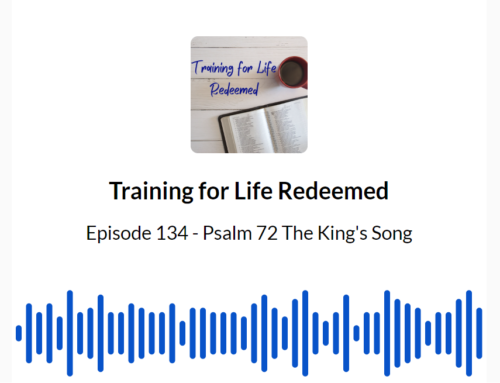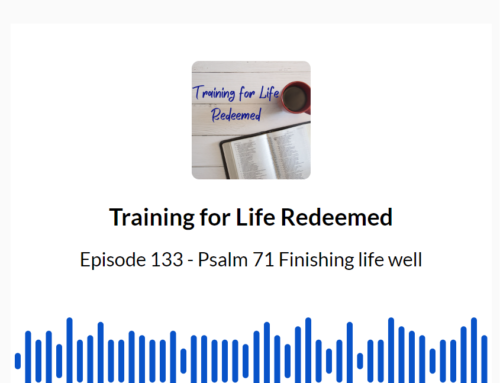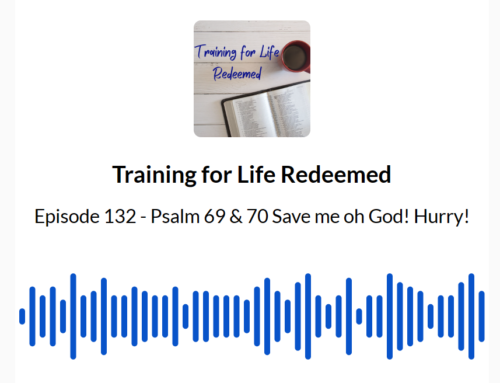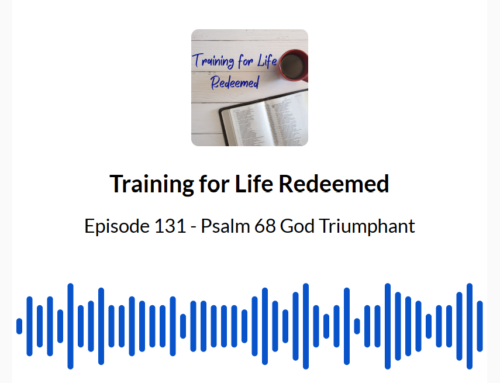Grab your notes for this episode by completing the form
and we will send you the link to all our notes.
In a world where God’s people are alienated and slandered, we reach that point where we just want to go home.
Psalm 63
[0:00] Hi everyone, and welcome to Training for Life Redeemed. I’m Dan, I’m here with my father, David Jackson, and we’re continuing to work our way through the Psalms. We’re up to Psalm 63, and Dad is going to read that for us.
Psalm 63
0 A song of David when he was in the wilderness of Judah.
1 God, you are my God.
At dawn I seek you.
My whole being thirsts for you.
My flesh yearns for you,
In a dry and weary land without water.
2 So I saw you in the holy place,
seeing your power and your glory.
3 Your covenant faithfulness is better than life.
My lips will cheer for you.
4 For this reason I bless you with my life.
In your name I lift up my hands.
5 As if with the abundance and finest food you fill my life.
and with ringing lips my mouth utters praises.
6 When I remember you on my bed,
During the night watches, I mull things over with you.
7 For you are a helper to me,
and in the shadow of your wings I sing out.
8 My whole being clings to you.
Your right hand hangs on to me.
9 But as for them, they seek the devastation of my life.
They will come to the depths of the earth.
10 They will be poured out onto sword blades.
They will be a portion for jackals.
11 The king rejoices in God.
All who swear by him glory,
When the mouths of those who speak lies are stopped.
Dan: [1:29] Well, Dad, we’ll start with the context, I guess.
That’s generally what you like to do when we’re looking at a psalm and it gives you some kind of context.
So it says a song when David was in the wilderness of Judah. When’s he in the wilderness of Judah? Is there one time, more than one time?
David: He seems to be there a lot, doesn’t he?
[1:49] He was there when he was hiding from Saul, and he went back when he was driven out of Jerusalem by his son Absalom. [2:01] When he was driven out by Absalom, he crossed the Jordan, and he went over to the eastern side, but I think that whole area is still his area where he hides out. So it’s hard to know, is he hiding from Saul, or is he hiding from Absalom?
Given the flow of Book 2, we’ve just done a psalm where he celebrated his enthronement, which was after Saul was dead and everything was settled. So I think this one might be looking at his time when Absalom chased him out of town, and that’s part of a sequence where David has settled up with his king and everything’s going well, until he decides to commit adultery and rape Bathsheba and murder her husband, and then the bomb drops on his family, and that’s when he is driven out of town.
So he’s back where he started, in the middle of the rollercoaster.
[3:03] You know, you get it right one day and you blow it up the next, which is pretty depressing.
So I’ve called this Bring Me Home.
Dan: Yeah, and the structure of this psalm seems to kind of indicate too that David’s probably a bit more mature to me, because when I read through it, it’s not your normal, you know, I’m being persecuted, oh, help me, save me, God is always faithful, he always saves me, of course he’s going to destroy these people, I’ll praise God, type kind of structure that we get. He’s really starting just with a, I want to be with you God, my body yearns for you, I have this drive to be with you, which would make sense if he had already been living next to the tabernacle for a while and was there.
[3:48] I find it quite interesting to hear how he talks about actually getting up bright and early in the morning, and he’s yearning for God at dawn, which I get up at 4.30 in the morning, for those of you who are listening in. That’s when I do my Bible and prayer time, it’s because it’s quiet, it’s generally uninterrupted, unless one of my children need to get up and go to the bathroom or something, but generally I get at least half an hour or so of time to devote to that. And I think it’s…That element is really important for us. Not necessarily that you have to do it in the morning, but actually having a proper time when you’re yearning for God, when you’re actually hanging out with God and learning from Him. And I think throughout history, as I look at college, you’re constantly looking at all these historical figures who became huge, like Calvin and Luther and everyone else, but they’re all up before the sun’s up and they’re all praying madly. That’s right, yes.
David: Yeah, I just, we were, I’m not a morning person, as you know, and so it was always my practice that you don’t end the day without having a quiet time.
[5:08] So, waking up in the morning was hard work, but getting to sleep was hard work. So I would read my Bible and pray at the end of the day. But when I go through the Bible and I go through history, like you say, people are at this stuff early in the morning.
I remember feeling very humbled. We were in Turkey looking at, I think it was.
[5:39] I can’t remember, at Pergamum I think, where Satan’s throne is, this huge amphitheatre on the side of a cliff. And we were standing there looking at this massive amphitheatre, and from a distance it just looks like this throne, and at the top of it was a temple to Apollo. So that seemed an appropriate thing in John’s letters to the seven churches. But while we’re standing there, looking out over this massive valley, in the middle of the day, the Moslem call to prayer goes up, and it went up from one mosque to another mosque to another mosque to another mosque, all the way echoing down the valley. And you realize they’re praying five times a day.
Dan: Pretty early in the morning.
David: And the first one is before dawn, and the other one is in the middle of the night. [6:32] When we’re in Iran, they pray three times a day. The Shiites do three times a day. The Sunnis do five times a day.
And if you get into evangelical circles, the ideal was Charles Simeon. And at Cambridge, you used to get up at four o’clock in the morning, light his fire and spend three hours in prayer and so on. And if you read the Puritans, the standing joke is, I got up half an hour before I went to bed to pray. You know, it’s like a competition.
But here, this reminds me of camping.
Dan: Well, he is camping.
David: He is camping. He’s out in the bush. And if you’ve been out in the bush, you know, sleeping in a swag or a tent, you do wake up an hour before dawn, because the whole bush comes alive and you find yourself laying there, looking at the sky, watching first light happen. And what else do you do? You have that quiet time listening to the day start and talking to the Lord.
And you were commenting on another line in there about in the middle of the night, he’s doing the same thing again. Yeah.
Dan: [7:39] The next stanza, it’s like he’s mulling things over all night while he’s on his night watch. [7:44] It’s my turn to stay up late while we’re camping and to keep yourself awake, probably, and also alert you spend his time praying and chatting to God and probably saying lots of normal things.
David: For those of us who spent, you know, army exercises sitting in a foxhole in the middle of the night in the bush. [8:06] Doing your two hours on, four hours off, two hours on, two hours off, you don’t sleep. Yeah. And that’s the watches of the night, the sentry duty, and you’re sitting there. Gotta be silent, gotta be tactical, can’t move. Well, you’re talking to God the whole time, especially when the snake came up.
But you’re looking at this and you’re going, yeah, we mull things over with God.
Instead of talking to ourselves, we talk to him. And for David, you just look at the poor man’s life.
From 17 to 30, Saul’s trying to kill him. He finally gets enthroned, and then a few years later, he’s doing the wrong thing and he’s back in the bush. And you’re looking at life as this roller coaster. And David is mulling it over in the middle of the night and waking up at dawn, talking it through with God. [9:08] That’s the Christian life.
David, Daniel, when he was in exile, three times a day, He would pray. at the temple, morning and evening sacrifice. You pray on your way to work and you drop in at the temple on the way home in the afternoon.
[9:26] If you’re an Anglican and you look at the old 1662 prayer book, morning and evening prayer. You drop in at the church in the village on the way to work, spend half an hour there, go to work, come back, the evening prayer, go home and have your dinner. It’s a lifestyle thing of walking with God.
Dan: [9:48] Yeah, I like how in verse three, he starts to talk about God’s covenant of faithfulness. It’s better than life, he says, but he then has the beginning of verse four, the for this reason, which is, I always, when I used to teach this stuff at school, I would always tell the kids, make sure you pay attention to the conjunctions, because they’re always really important, right?
And so the for this reason is the conjunction that’s showing that God’s covenant faithfulness is what leads David to then live out his life in any kind of faithfulness. And I think we don’t remind ourselves enough of that if we’re not regularly in our Bibles, in prayer, you start to forget God’s covenant faithfulness.
I mean, I don’t know if it’s this one or if it’s the next psalm we’re going to do next week, where it also talks about, what was it? I’m going to need to be reminded now. What was it? [10:48] Yeah, it talks about remembering God’s actions, and I was like, it’s important for us to remember God’s actions, because His actions are His covenant faithfulness, and so when I see His covenant faithfulness, it reminds me of who He is, of His faithfulness to what He’s promised, reminds me of His promises, and that leads me to then actually live that out.
David: [11:07] I’ve been working on Psalm 92, and in that psalm, again, you have this same practice of morning and evening prayer. Only he starts in the morning, I remember your covenant faithfulness. And at night, I remember your mighty works, your amunah, your reliability. [11:30] And then he talks about God’s mighty works. So in the morning, I get up going, God is with me, he’s promised all this stuff. And then I finish the day by looking back and saying, yep, he was with me through the day, and the whole thing is being thankful in the midst of that.
I just like this little phrase that says, “‘For you are a helper to me.'” And that word helper means you are my ally. I don’t go through the day on my own. I am going through the day with an ally who rescues me, who fights for me, who takes care of all my issues. [12:09] I’m not alone, I’m not doing this in isolation.
Dan: Yeah, and the psalm Dad now then concludes with this expected conclusion, the enemies of God, they’re going to be destroyed, they’re going out of the depths of the earth, they’re poured out, all that kind of stuff, the jackals are going to eat them, and there’s that element of judgment that comes, really that comes because God is covenantally faithful, and if you are outside of that covenant and he’s faithful in that sense too.
[12:40] I feel like when I’m reading the psalm though that it kind of ends short. You get to verse 11, the king rejoices in God all who swear by him glory. When the mouths of those who speak lies are stopped.
I feel like, when I first read it, I’m like, shouldn’t that just keep going? Like, shouldn’t there be like another two verses or something to this psalm? So it kind of wraps it up nicely, but, because it’s just all about those who speak lies that stop.
David: And that’s been the story all through David’s life, that here is an innocent man, certainly during that period with Saul.
Dan: I was going to say, is he innocent in this context?
David: Well, yeah, if it’s Absalom, he got what he deserved, or less than he deserved. But the point there is, right throughout David’s life, people are accusing him falsely. He was accused of wanting to kill Saul, and that was the justification for all those years of Saul running around trying to kill him. And so these lies that are being told, Absalom sets up this whole business about how he’s going to take over his father’s throne, and he tells lies about his dad, come and have your court case with me. Don’t wait for dad, he’s useless. [13:58] I’ll give you a generous settlement.
So the things that are being said as David leaves the town, people are cursing him, you man of blood, you this, you that. And the words are doing the injury, partially because he knows he’s sinned, but also because he knows he’s forgiven, and yet the slander continues.
And so there’s this longing for God to speak the truth about who I am and where I fit in his world, and to put an end to all of this. And you have to admit, you know, if you look around the world, he describes what’s going to happen to people who tell God to go jump in the lake. And they’re all out there slaughtering each other. And they’ve pushed us out of the world. We’re camped out in exile in the bush. And it’s us talking to God about, take me home. I just want to go home and be with you. Which is the end of the whole Bible, isn’t it? Maranatha, come Lord Jesus.
Dan: Well guys, that brings us to the end of this episode. If you would love to come and grab the study notes so that you can go further into Psalm 63, head over to tradingforliferedeemed.com/126. [15:24] Otherwise hit the subscribe button and come and join us again next week.



